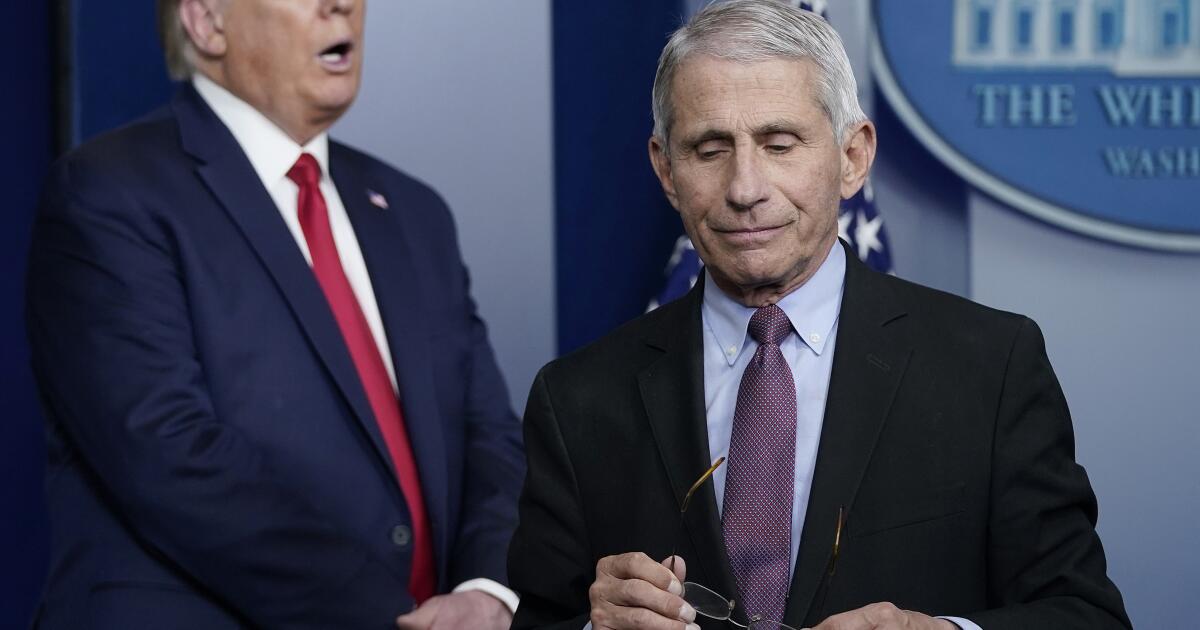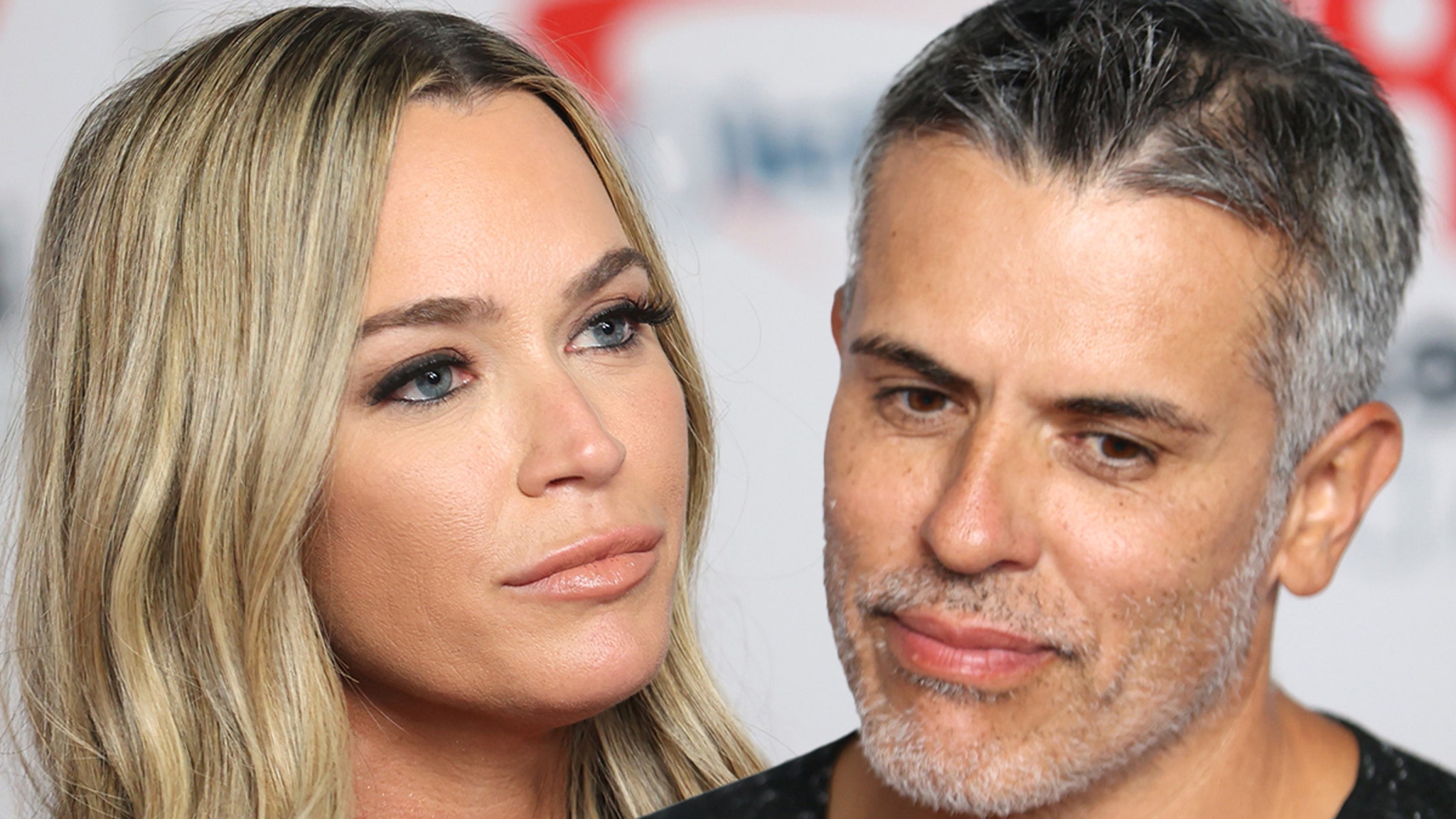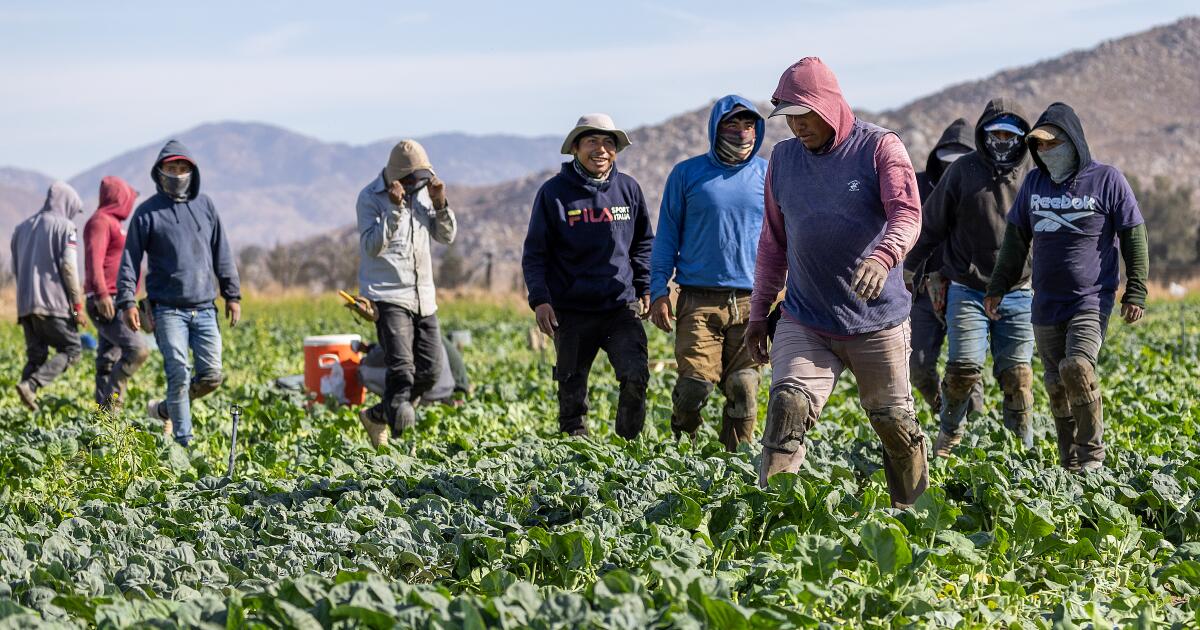Science
Opinion: Scientists have become sitting ducks. We need leaders to step up and defend us

Nearly a century ago, when global dominance in scientific research began shifting to the United States from Europe, our nation built an empire firmly grounded in the natural sciences. America’s research universities and institutes flourished and provided the discoveries leading to the Manhattan Project, Silicon Valley’s tech industry, NASA and space exploration, vaccines to fight polio and other global infections, and new treatments for cancer, Alzheimer’s disease, diabetes and depression.
As a science envoy for the State Department, I saw first-hand how global leaders and technocrats admired the U.S. for its higher education system of scientific training and support. They spoke to me with pride about their time spent at U.S. universities or their hopes and aspirations that one day their sons and daughters might study here.
I have devoted my life to vaccine science. During the pandemic, our team at the Texas Children’s Hospital and Baylor College of Medicine developed a low-cost COVID vaccine that was scaled for production in India and Indonesia, where almost 100 million doses were administered.
But here in the United States, thousands of Americans needlessly perished because they refused a COVID-19 immunization during our awful Delta wave in the summer and fall of 2021 and the BA.1 Omicron wave in the winter of 2022. Analyses by myself and colleagues have found that 200,000 unvaccinated Americans died during this period. Overwhelmingly, those deaths occurred in Republican strongholds, including 40,000 in my state of Texas. A closer examination reveals that the redder the county, the lower the immunization rates and the higher the death rates.
The dead were victims of what we too often label as “misinformation,” as though these victims succumbed to random junk on the internet. This was not always the case. The unvaccinated were targeted by a well-financed and newly politicized anti-vaccine movement.
It accelerated at the CPAC conference of conservatives in Dallas in the summer of 2021, when prominent anti-vaccine activists were featured speakers and one Republican lawmaker from the House Freedom Caucus announced that vaccinations would lead to government confiscations of Bibles and guns.
Just before CPAC, another prominent Freedom Caucus member had disparaged vaccinators as “medical brown shirts,” meaning Nazis, and she later attacked me and other scientists by name on Steve Bannon’s podcast. Other caucus members regularly made unsupported and spectacular claims about the benefits of hydroxychloroquine or ivermectin as COVID treatments, while disparaging COVID-19 vaccinations.
Fox News piled on, misleading a huge swath of Americans. The partisan divide driving low COVID vaccinations and high deaths in 2021-22 was so profound that Liz Hamel of the Kaiser Family Foundation pronounced: “If I wanted to guess if somebody was vaccinated or not and I could only know one thing about them, I would probably ask what their party affiliation is.”
Now in 2023 the GOP Senate and House have intensified their efforts to promote conspiracies or denigrate science. Sen. Ron Johnson (R-Wis.) went on Fox News in August claiming the pandemic “was all pre-planned by an elite group of people.”
Partisan politics is not the only factor driving vaccine disinformation, but this aspect has become the most intractable and lethal. It is also uncomfortable to discuss. I was taught that science and politics do not mix, and that we scientists need to be neutral. But what happens when the data overwhelmingly demonstrate that thousands of Americans died from political targeting?
During the 1930s, Joseph Stalin’s rise to authoritarian control relied on exiling or imprisoning prominent scientists. This had catastrophic consequences for Soviet productivity, especially in agricultural science.
Now American biomedical scientists have become targets. A 2021 survey found that 15% of scientists who engage with the news media about COVID-19 have received death threats. Another in 2022 found that almost 40% of COVID-19 scientists report experiencing at least one confrontation either online or in person, including death threats.
I’ve been singled out regularly by political extremists and Fox News anchors. Such statements reverberate and result in online threats or actual stalking.
How can America preserve its hard-earned dominance in science, especially given the volume of recent attacks on biomedicine?
First, we must protect biomedical scientists. So far there have been few public statements of support from any branch of the U.S. government, and our university leaders and scientific societies are mostly silent. There are no organizations on which biomedical scientists can depend for legal help if they are targets of public smear campaigns. This silence could well shape the plans of young people now choosing careers, as they see how scientists are treated in America. The U.S. must also recognize how anti-science rhetoric has emerged as a new lethal force and find mechanisms to halt its advance. Pseudoscience carved a path of destruction in the U.S.S.R. almost 100 years ago, and now it is happening again. Beyond the 200,000 deaths that have already occurred, as activism against COVID vaccines morphs into panic about all immunizations, we could see the return of catastrophic childhood infections such as measles or polio. The fact that polio genomes have been detected recently in the wastewaters of New York and London is an ominous warning. Over the last two decades we made steady progress in vaccinating the world’s children, with impressive declines in pediatric deaths. But those gains are fragile.
We must find ways to preserve our achievements in biomedicine and support scientists, even if that means both the scientists and those in positions of power engage political leaders and challenge ideologues to reject their anti-science rhetoric and agenda. Otherwise, almost a century of America’s preeminence in science will soon decline, our democratic values will erode, and our global stature will fall.
Peter Hotez is a professor and dean at Baylor College of Medicine and co-director of the Texas Children’s Hospital Center for Vaccine Development. He is the author, most recently, of “The Deadly Rise of Anti-Science: A Scientist’s Warning.”

Science
Cluster of farmworkers diagnosed with rare animal-borne disease in Ventura County

A cluster of workers at Ventura County berry farms have been diagnosed with a rare disease often transmitted through sick animals’ urine, according to a public health advisory distributed to local doctors by county health officials Tuesday.
The bacterial infection, leptospirosis, has resulted in severe symptoms for some workers, including meningitis, an inflammation of the brain lining and spinal cord. Symptoms for mild cases included headaches and fevers.
The disease, which can be fatal, rarely spreads from human to human, according to the U.S. Centers for Disease Control and Prevention.
Ventura County Public Health has not given an official case count but said it had not identified any cases outside of the agriculture sector. The county’s agriculture commissioner was aware of 18 cases, the Ventura County Star reported.
The health department said it was first contacted by a local physician in October, who reported an unusual trend in symptoms among hospital patients.
After launching an investigation, the department identified leptospirosis as a probable cause of the illness and found most patients worked on caneberry farms that utilize hoop houses — greenhouse structures to shelter the crops.
As the investigation to identify any additional cases and the exact sources of exposure continues, Ventura County Public Health has asked healthcare providers to consider a leptospirosis diagnosis for sick agricultural workers, particularly berry harvesters.
Rodents are a common source and transmitter of disease, though other mammals — including livestock, cats and dogs — can transmit it as well.
The disease is spread through bodily fluids, such as urine, and is often contracted through cuts and abrasions that contact contaminated water and soil, where the bacteria can survive for months.
Humans can also contract the illness through contaminated food; however, the county health agency has found no known health risks to the general public, including through the contact or consumption of caneberries such as raspberries and blackberries.
Symptom onset typically occurs between two and 30 days after exposure, and symptoms can last for months if untreated, according to the CDC.
The illness often begins with mild symptoms, with fevers, chills, vomiting and headaches. Some cases can then enter a second, more severe phase that can result in kidney or liver failure.
Ventura County Public Health recommends agriculture and berry harvesters regularly rinse any cuts with soap and water and cover them with bandages. They also recommend wearing waterproof clothing and protection while working outdoors, including gloves and long-sleeve shirts and pants.
While there is no evidence of spread to the larger community, according to the department, residents should wash hands frequently and work to control rodents around their property if possible.
Pet owners can consult a veterinarian about leptospirosis vaccinations and should keep pets away from ponds, lakes and other natural bodies of water.
Science
Political stress: Can you stay engaged without sacrificing your mental health?

It’s been two weeks since Donald Trump won the presidential election, but Stacey Lamirand’s brain hasn’t stopped churning.
“I still think about the election all the time,” said the 60-year-old Bay Area resident, who wanted a Kamala Harris victory so badly that she flew to Pennsylvania and knocked on voters’ doors in the final days of the campaign. “I honestly don’t know what to do about that.”
Neither do the psychologists and political scientists who have been tracking the country’s slide toward toxic levels of partisanship.
Fully 69% of U.S. adults found the presidential election a significant source of stress in their lives, the American Psychological Assn. said in its latest Stress in America report.
The distress was present across the political spectrum, with 80% of Republicans, 79% of Democrats and 73% of independents surveyed saying they were stressed about the country’s future.
That’s unhealthy for the body politic — and for voters themselves. Stress can cause muscle tension, headaches, sleep problems and loss of appetite. Chronic stress can inflict more serious damage to the immune system and make people more vulnerable to heart attacks, strokes, diabetes, infertility, clinical anxiety, depression and other ailments.
In most circumstances, the sound medical advice is to disengage from the source of stress, therapists said. But when stress is coming from politics, that prescription pits the health of the individual against the health of the nation.
“I’m worried about people totally withdrawing from politics because it’s unpleasant,” said Aaron Weinschenk, a political scientist at the University of Wisconsin–Green Bay who studies political behavior and elections. “We don’t want them to do that. But we also don’t want them to feel sick.”
Modern life is full of stressors of all kinds: paying bills, pleasing difficult bosses, getting along with frenemies, caring for children or aging parents (or both).
The stress that stems from politics isn’t fundamentally different from other kinds of stress. What’s unique about it is the way it encompasses and enhances other sources of stress, said Brett Ford, a social psychologist at the University of Toronto who studies the link between emotions and political engagement.
For instance, she said, elections have the potential to make everyday stressors like money and health concerns more difficult to manage as candidates debate policies that could raise the price of gas or cut off access to certain kinds of medical care.
Layered on top of that is the fact that political disagreements have morphed into moral conflicts that are perceived as pitting good against evil.
“When someone comes into power who is not on the same page as you morally, that can hit very deeply,” Ford said.
Partisanship and polarization have raised the stakes as well. Voters who feel a strong connection to a political party become more invested in its success. That can make a loss at the ballot box feel like a personal defeat, she said.
There’s also the fact that we have limited control over the outcome of an election. A patient with heart disease can improve their prognosis by taking medicine, changing their diet, getting more exercise or quitting smoking. But a person with political stress is largely at the mercy of others.
“Politics is many forms of stress all rolled into one,” Ford said.
Weinschenk observed this firsthand the day after the election.
“I could feel it when I went into my classroom,” said the professor, whose research has found that people with political anxiety aren’t necessarily anxious in general. “I have a student who’s transgender and a couple of students who are gay. Their emotional state was so closed down.”
That’s almost to be expected in a place like Wisconsin, whose swing-state status caused residents to be bombarded with political messages. The more campaign ads a person is exposed to, the greater the risk of being diagnosed with anxiety, depression or another psychological ailment, according to a 2022 study in the journal PLOS One.
Political messages seem designed to keep voters “emotionally on edge,” said Vaile Wright, a licensed psychologist in Villa Park, Ill., and a member of the APA’s Stress in America team.
“It encourages emotion to drive our decision-making behavior, as opposed to logic,” Wright said. “When we’re really emotionally stimulated, it makes it so much more challenging to have civil conversation. For politicians, I think that’s powerful, because emotions can be very easily manipulated.”
Making voters feel anxious is a tried-and-true way to grab their attention, said Christopher Ojeda, a political scientist at UC Merced who studies mental health and politics.
“Feelings of anxiety can be mobilizing, definitely,” he said. “That’s why politicians make fear appeals — they want people to get engaged.”
On the other hand, “feelings of depression are demobilizing and take you out of the political system,” said Ojeda, author of “The Sad Citizen: How Politics is Depressing and Why it Matters.”
“What [these feelings] can tell you is, ‘Things aren’t going the way I want them to. Maybe I need to step back,’” he said.
Genessa Krasnow has been seeing a lot of that since the election.
The Seattle entrepreneur, who also campaigned for Harris, said it grates on her to see people laughing in restaurants “as if nothing had happened.” At a recent book club meeting, her fellow group members were willing to let her vent about politics for five minutes, but they weren’t interested in discussing ways they could counteract the incoming president.
“They’re in a state of disengagement,” said Krasnow, who is 56. She, meanwhile, is looking for new ways to reach young voters.
“I am exhausted. I am so sad,” she said. “But I don’t believe that disengaging is the answer.”
That’s the fundamental trade-off, Ojeda said, and there’s no one-size-fits-all solution.
“Everyone has to make a decision about how much engagement they can tolerate without undermining their psychological well-being,” he said.
Lamirand took steps to protect her mental health by cutting social media ties with people whose values aren’t aligned with hers. But she will remain politically active and expects to volunteer for phone-banking duty soon.
“Doing something is the only thing that allows me to feel better,” Lamirand said. “It allows me to feel some level of control.”
Ideally, Ford said, people would not have to choose between being politically active and preserving their mental health. She is investigating ways to help people feel hopeful, inspired and compassionate about political challenges, since these emotions can motivate action without triggering stress and anxiety.
“We want to counteract this pattern where the more involved you are, the worse you are,” Ford said.
The benefits would be felt across the political spectrum. In the APA survey, similar shares of Democrats, Republicans and independents agreed with statements like, “It causes me stress that politicians aren’t talking about the things that are most important to me,” and, “The political climate has caused strain between my family members and me.”
“Both sides are very invested in this country, and that is a good thing,” Wright said. “Antipathy and hopelessness really doesn’t serve us in the long run.”
Science
Video: SpaceX Unable to Recover Booster Stage During Sixth Test Flight

President-elect Donald Trump joined Elon Musk in Texas and watched the launch from a nearby location on Tuesday. While the Starship’s giant booster stage was unable to repeat a “chopsticks” landing, the vehicle’s upper stage successfully splashed down in the Indian Ocean.
-

 Business1 week ago
Business1 week agoColumn: Molly White's message for journalists going freelance — be ready for the pitfalls
-

 Science6 days ago
Science6 days agoTrump nominates Dr. Oz to head Medicare and Medicaid and help take on 'illness industrial complex'
-

 Politics1 week ago
Politics1 week agoTrump taps FCC member Brendan Carr to lead agency: 'Warrior for Free Speech'
-
/cdn.vox-cdn.com/uploads/chorus_asset/file/25739950/247386_Elon_Musk_Open_AI_CVirginia.jpg)
/cdn.vox-cdn.com/uploads/chorus_asset/file/25739950/247386_Elon_Musk_Open_AI_CVirginia.jpg) Technology1 week ago
Technology1 week agoInside Elon Musk’s messy breakup with OpenAI
-

 Lifestyle1 week ago
Lifestyle1 week agoSome in the U.S. farm industry are alarmed by Trump's embrace of RFK Jr. and tariffs
-

 World1 week ago
World1 week agoProtesters in Slovakia rally against Robert Fico’s populist government
-

 Health2 days ago
Health2 days agoHoliday gatherings can lead to stress eating: Try these 5 tips to control it
-

 News1 week ago
News1 week agoThey disagree about a lot, but these singers figure out how to stay in harmony















